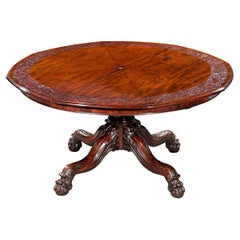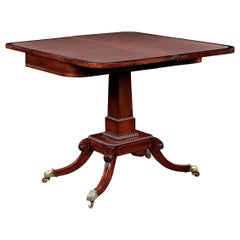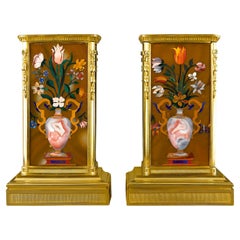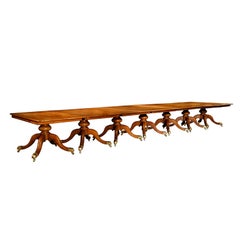Want more images or videos?
Request additional images or videos from the seller
1 of 7
Johnstone, Jupe & Co. Patent Expanding Table
$335,000List Price
About the Item
- Creator:Johnstone, Jupe & Co. (Maker)
- Dimensions:Height: 28.5 in (72.39 cm)Diameter: 54.5 in (138.43 cm)
- Style:Regency (In the Style Of)
- Materials and Techniques:
- Place of Origin:
- Period:
- Date of Manufacture:circa 1835
- Condition:
- Seller Location:New Orleans, LA
- Reference Number:Seller: 30-78701stDibs: LU891114672802
About the Seller
5.0
Recognized Seller
These prestigious sellers are industry leaders and represent the highest echelon for item quality and design.
Established in 1912
1stDibs seller since 2010
114 sales on 1stDibs
Typical response time: 4 hours
Authenticity Guarantee
In the unlikely event there’s an issue with an item’s authenticity, contact us within 1 year for a full refund. DetailsMoney-Back Guarantee
If your item is not as described, is damaged in transit, or does not arrive, contact us within 7 days for a full refund. Details24-Hour Cancellation
You have a 24-hour grace period in which to reconsider your purchase, with no questions asked.Vetted Professional Sellers
Our world-class sellers must adhere to strict standards for service and quality, maintaining the integrity of our listings.Price-Match Guarantee
If you find that a seller listed the same item for a lower price elsewhere, we’ll match it.Trusted Global Delivery
Our best-in-class carrier network provides specialized shipping options worldwide, including custom delivery.You May Also Like
Rare & Early Jupe Expanding Dining Table by Johnstone & Jeanes
By Johnstone, Jeanes & Co.
Located in London, GB
A Rare 'Jupe's' Extensible Mechanical Action Circular Dining Table
By Johnstone & Jeanes of New Bond Street
Together with its original Leaf Cabinet
By Johnstone & Jeanes
Constructe...
Category
Antique 19th Century English Dining Room Tables
Materials
Mahogany
No35 Scarpa Table – Customizable Round Dining Table by Joel Escalona
By NONO
Located in Ciudad de México, CDMX
No35 Scarpa Table – Customizable Round Dining Table by Joel Escalona
———
Introducing the Scarpa Collection, a homage to the legendary Italian architect and designer, Carlo Scarpa....
Category
2010s Mexican Modern Dining Room Tables
Materials
Hardwood
Black Top Metal Table
Located in Brooklyn, NY
Metal base table with black and striped square top. Great as a pedestal or small dining table.
(Please confirm item location - NY or NJ - with dealer).
Category
20th Century Pedestals
No25 Scarpa Table – Made-to-Order Round Dining Table with Cylindrical Base
By NONO
Located in Ciudad de México, CDMX
No25 Scarpa Table – Made-to-Order Round Dining Table with Cylindrical Wooden Base
———
Introducing the Scarpa Collection, a homage to the legendary Italian architect and designer, Ca...
Category
2010s Mexican Modern Dining Room Tables
Materials
Hardwood
$14,589
H 29.93 in Dm 55.12 in
No5 Scarpa Table – Round Solid Wood Dining Table with Cylindrical Base by Joel E
By NONO
Located in Ciudad de México, CDMX
No5 Scarpa Table – Round Solid Wood Dining Table with Cylindrical Base by Joel Escalona
———
Introducing the Scarpa Collection, a homage to the legendary Italian architect and desig...
Category
2010s Mexican Modern Dining Room Tables
Materials
Hardwood
$14,589
H 29.93 in Dm 55.12 in
No12 Scarpa Table by NONO – Round Solid Wood Dining Table, Customizable Design
By NONO
Located in Ciudad de México, CDMX
No12 Scarpa Table by NONO – Round Solid Wood Dining Table, Customizable Design
———
Introducing the Scarpa Collection, a homage to the legendary Italian architect and designer, Car...
Category
2010s Mexican Modern Dining Room Tables
Materials
Hardwood
$10,941 Sale Price
25% Off
H 29.93 in Dm 55.12 in
No45 Scarpa Dining Table – Solid Wood Round Dining Table by Joel Escalona
By NONO
Located in Ciudad de México, CDMX
No45 Scarpa Dining Table – Solid Wood Round Dining Table by Joel Escalona
———
Introducing the Scarpa Collection, a homage to the legendary Italian architect and designer, Carlo Sca...
Category
2010s Mexican Modern Dining Room Tables
Materials
Hardwood
$12,931 Sale Price
25% Off
H 29.93 in Dm 55.12 in
No8 Scarpa Table by NONO – Custom Round Dining Table with Sculptural Solid Base
By NONO
Located in Ciudad de México, CDMX
No8 Scarpa Table by NONO – Custom Round Dining Table with Sculptural Solid Base
———
Introducing the Scarpa Collection, a homage to the legendary Italian architect and designer, Ca...
Category
2010s Mexican Modern Dining Room Tables
Materials
Hardwood
$10,941 Sale Price
25% Off
H 29.93 in Dm 55.12 in
No22 Scarpa Table by NONO – Customizable Dining Table in Solid Wood Design
By NONO
Located in Ciudad de México, CDMX
No22 Scarpa Table by NONO – Customizable Dining Table in Solid Wood Design
———
Introducing the Scarpa Collection, a homage to the legendary Italian architect and designer, Carlo Sc...
Category
2010s Mexican Modern Dining Room Tables
Materials
Hardwood
$10,941 Sale Price
25% Off
H 29.93 in Dm 55.12 in
No28 Scarpa Table – Custom Round Dining Table in Solid Wood by Joel Escalona
By NONO
Located in Ciudad de México, CDMX
No28 Scarpa Table – Custom Round Dining Table in Solid Wood by Joel Escalona
———
Introducing the Scarpa Collection, a homage to the legendary Italian architect and designer, Carlo...
Category
2010s Mexican Modern Dining Room Tables
Materials
Hardwood
$14,589
H 29.93 in Dm 55.12 in
More From This Seller
View AllExpanding Jupe Dining Table by Johnstone and Jeanes
By Robert Jupe
Located in New Orleans, LA
This exceptionally rare circular expanding dining table was designed by Robert Jupe and crafted by the English cabinetmakers Johnstone & Jeanes, successors to Johnstone, Jupe & Co. One of only a handful known from the firm, this table illustrates the Victorian era's quest to combine technical innovation with superb and beautiful craftsmanship. Complete with its original leaves, the table’s circular top is formed from eight separate segments. When the top is rotated, an ingenious swivel mechanism causes the sections to diverge, allowing a set of small or large leaves to be inserted for an adjustable increase in size.
The design for the table was patented by Robert Jupe in 1835, who had envisioned “an improved expanding table so constructed that the sections composing its surface may be caused to diverge from a common center and that the spaces caused thereby may be filled up by inserting leaves or filling pieces.” The first of these fascinating tables were created between 1835 and 1840 during his partnership with John Johnstone and their firm of Johnstone, Jupe & Co. in London. Jupe left the company in 1840, after which the firm changed its name due to a new partnership and became Johnstone & Jeanes. The firm would eventually achieve international fame for its remarkable designs, exhibiting a "circular table made on the expanding principle" like this one at the Great Exhibition of 1851.
Jupe was not alone in his fascination with combining the technical merits of engineering and mechanics with the more artful pursuit of cabinet making. The first half of the 19th century saw a prolific increase in the popularity of applying new ideas to furniture principles, which allowed furniture to serve many purposes. The resulting “patent” furniture...
Category
Antique 19th Century English Victorian Dining Room Tables
Materials
Mahogany
Regency-Era Card Table
Located in New Orleans, LA
This ingenious late Regency card table was designed with both beauty and entertainment in mind. When not in use, its folded D-shaped top sits against the wall providing an elegant si...
Category
Antique Early 19th Century English Regency Game Tables
Materials
Wood
$8,850
Russian Malachite and Pietre Dure Plinths
Located in New Orleans, LA
The exquisite art of pietre dure is at its absolute finest in this spectacular pair of Russian ormolu and malachite plinths. True works of art of the Restauration period, these plinths each feature a matching pietre dure mosaic crafted of the finest stones, all chosen to create a sense of depth and dimensionality in the final work. Depicting an onyx vase with tulips, roses, daffodils, magnolia and other flowers, these pietre dure panels are among the finest examples of this ancient art we have seen.
The pietre dure is complemented by malachite panels of the highest quality, exhibiting exceptional depth through its extraordinary cellular structure. Malachite is one of Russia’s most precious stones, and its presence in these plinths indicates commission and ownership by an individual of considerable status. Mounted in an excellent stepped ormolu base, these plinths originally served as bases for vases or candelabra.
The overall execution and appearance of these plinths is very characteristic of the taste associated with the immensely wealthy collector Nicolas Demidoff. As early as 1806, Demidoff had commissioned the Parisian goldsmith Henri August to supply a guéridon; in 1819, he ordered famed French bronzier Pierre-Philippe Thomire to supply mounts for a massive malachite vase (now in the Metropolitan Museum of Art, New York), as well as a console table with legs in the form of Nike. Other commissions included a table given as a gift to Grand Duke Leopoldo II of Florence, now in the Pitti Palace. Demidoff eventually settled in Florence in 1822 and became Russian minister to the Tuscan Court. Elevated to the rank of Count of San Donato by the Grand Duke, he built a magnificent villa at San Donato on the site of lands formerly owned by the Medici. The villa was later inherited by Anatole, his son, Prince of San Donato, and there are records which confirm transactions he had with the Opificio delle Pietre Dure.
The 19th century proved to be the golden age of Russian malachite. The stone became a sign of prestige and a token of wealth, so much so that Russian papers of the time wrote: "To afford having a big piece wrought in malachite is synonymous to owning diamonds." Year after year the Russian (Romanov) treasury paid increasingly unreasonable prices to hoard the best malachite, much of which went into Romanov palaces and extravagant objets d'art. The Hermitage Museum possesses a collection of over two hundred examples of this “palatial” malachite...
Category
Antique 19th Century Russian Pedestals
Materials
Malachite, Ormolu
$168,500 / set
Incredible English Mahogany Seven-Pedestal Dining Table
Located in New Orleans, LA
Measuring over 30 feet in length, this tremendous and highly versatile English dining table is the greatest. It has the ability to transform to a multitude of sizes to fit any occasi...
Category
Antique 19th Century British Neoclassical Dining Room Tables
Materials
Brass
19th Century Exhibition Model of Expanding Table by Samuel Hawkins
By Samuel Hawkins
Located in New Orleans, LA
A masterpiece of both cabinetmaking and mechanical engineering, this one-of-a-kind expanding table was crafted by the renowned cabinetmaker Samuel Hawkins of London for the Great Exhibition of 1851. Diminutive in size, the fascinating table was designed as a model to demonstrate Hawkins’ innovative patent screw movement to visitors of the Exhibition – six million people in total over five months. It was exhibited again a century later at the Victoria & Albert Museum during the Festival of Britain, an event intended “to symbolise two main qualities of the national character: realism and strength on the one hand, and, on the other, independence and imagination” (Catalogue of the Exhibition, 1951, p.117). To this day, the miniature masterpiece demonstrates the quest of English furniture makers to combine technical innovation with superb craftsmanship.
Displaying exceptional ingenuity, Hawkins’ wind-out screw mechanism allowed one to extend the table’s base to accommodate concentric leaves with the simple crank of a handle. It is based on the inventive expanding table originally designed by Robert Jupe in 1835, which used a swivel mechanism to separate sections of the tabletop and allow for segmented leaves to be inserted. Hawkins’ tabletop, on the other hand, extends outwards directly from the center in order to accommodate additional leaves around its diameter. This unique design allowed the mechanism to also smoothly operate on rectangular tables, which could be wound out from the middle to allow for more table space.
Hawkins was not alone in his endeavor to combine the technical merits of engineering and mechanics with the most artful pursuit of cabinetmaking. The first half of the 19th century saw a prolific increase in the popularity of applying new ideas to traditional furniture principles, which allowed furniture to serve many purposes. The resulting “patent” furniture was practical and refined, though few were as innovative as Hawkins’ prodigious design.
Carved with the year of the Exhibition on the beautifully designed pedestal base, the table is a testament to the significance of this innovation. The model is mentioned in detail in the catalog of the Great Exhibition of 1851, the first international exhibition of industry, manufacturing, and science. Held at London’s dazzling Crystal Palace, its visitors were treated to exhibits from around the globe, including feats of engineering, innovations in industry, and marvels of design. Queen Victoria herself was a frequent visitor, along with her husband, Prince Albert, and others including Charlotte...
Category
Antique 19th Century English Other Tables
Materials
Mahogany
Elkington & Co. Garniture Set
By W. Albert Willms, Elkington & Co.
Located in New Orleans, LA
This extraordinary enameled silverplate and crystal dish set by Elkington & Co. exemplifies one of the company's earliest and most celebrated ventures into champlevé enamel work. Ins...
Category
Antique 19th Century English Other Garniture
Materials
Crystal, Silver Plate
$29,850 / set
Recently Viewed
View AllMore Ways To Browse
Antique Expandable Tables
Antique Capstan
Expandable Mahogany Table
Expanding Dining Tables Antique
Jupe Table
72 Inch Mahogany Dining Table
Jupe Dining Table
Antique Jupe Table
Antique Dining Table For 12
Marble Tulip Tables
3 Pedestal Mahogany Dining Table
Extra Large Round Dining Table
Granite Table Base
Mastercraft Brass And Glass Dining Tables
Metamorphic Table
Quarter Sawn Oak Dining Table
Round Stone Pedestal Dining Table
Stole Mobelfabrik



